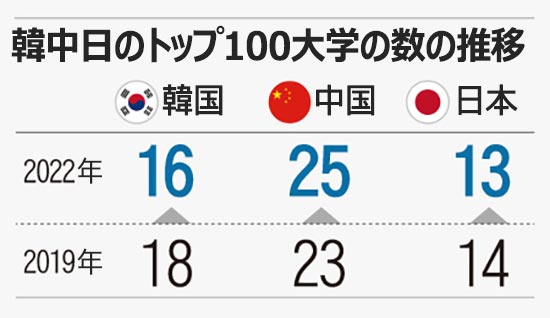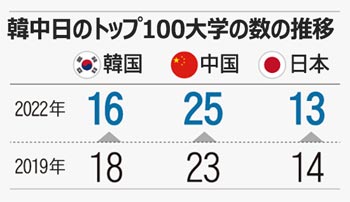It was revealed that many of the Korean universities that fell in the rankings from last year were affected by the decline in the “alumni reputation” index. The “Alumni Reputation”, which represents 10% of the evaluation in the “QS Asian University Rankings”, is calculated by asking personnel managers of companies around the world “which graduates they would like to hire”.
Kyung Hee University dropped from 65th to 70th place on the ‘Alumni Reputation’ Index. As a result, the overall rating dropped three degrees from 39 to 42. “Graduate..
Read more

It was revealed that many of the Korean universities that fell in the rankings from last year were affected by the decline in the “alumni reputation” index. The “Alumni Reputation”, which represents 10% of the evaluation in the “QS Asian University Rankings”, is calculated by asking personnel managers of companies around the world “which graduates they would like to hire”.
Kyung Hee University dropped from 65th to 70th place on the ‘Alumni Reputation’ Index. As a result, the overall rating dropped three degrees from 39 to 42. The HUFS went from the 87th to the 108th last year, the Ewha Women’s University went from the 95th to the 113th, the National University of Pusan went up from the 120th to the 130th and the Konkuk University has risen from 147th to 196th in the ranking of graduate reputation. , The National University of Chungnam retreated from 168th to 206th, dragging the overall ranking down.
A HR manager of a South Korean IT company said: “We are now looking for employees with excellent teamwork, adaptability and communication skills.” Students who have written it down on paper. “Nowadays, Korean companies prefer university graduates. of the United States and Hong Kong, but global companies are even more so. It is emphasized that South Korean education remains in the industrial age of the past, in which students memorize knowledge and solve objective problems.
South Korean universities have also struggled in an index that measures how actively universities are conducting joint research with universities in other countries. In this year’s assessment, only nine Korean universities were ranked in the top 100 in Asia in terms of international research cooperation. 41 schools from China and 12 from Japan were nominated. Eight South Korean universities ranked in the top 100 in terms of percentage of foreign faculty, while China and Japan ranked 14 and 13 respectively.
While government support is important in enhancing graduate reputations and increasing the internationalization index, universities themselves are expected to strive to innovate their curricula into content suitable for practical work and to actively interact with foreign universities. Professor Emeritus Lee Gun-woo of Seoul National University said: “Even when eminent foreign professors and excellent international students come to Korea, they suffer from the university culture that treats foreigners as ‘outsiders.’ As they seek various aids such as living expenses. so that they can focus on their work on their own, we should also simplify immigration-related procedures such as visas. “
Journalist Kim Tae-joo
Chosun Ilbo / Chosun Ilbo Japanese version
Copyright (c) Chosunonline.com



